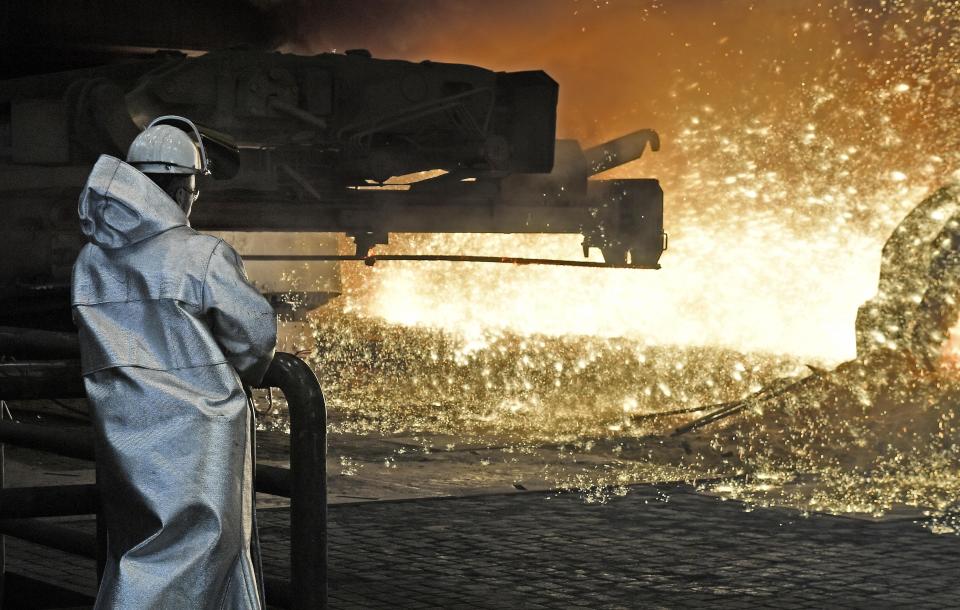Why Germany really wants Trump to end the trade war
Thirty years after the fall of the Berlin Wall, and 29 years after Germany was reunified into a single country, Europe’s strongest economy is facing significant headwinds that risk spilling over into the rest of the continent and the rest of the world.
“The [German] economy is at the brink of recession,” Oliver Rakau, chief German economist at Oxford Economics, told Yahoo Finance.
Much as in the U.S., the manufacturing sector is leading the declines. The closely watched PMI for October remained near a seven-year low, while service-sector activity was at its weakest pace in three years.
“If you look at the industrial sector, especially, it remains a big headwind,” Rakau said, with PMI “suggesting that the weakness of global trade, but also the homemade troubles in the German automotive sector, continue to weigh on this pivotal industry.”
“The biggest problem is uncertainty, including that caused by the Chinese-U.S. trade war,” Finance Minister Olaf Scholz told reporters in August.

Why it matters
Germany’s economy is inexorably linked to the world economy and the economy of the United States. It’s the fifth largest economy in the world, the largest consumer market in the eurozone, and is the largest European trading partner for U.S. goods, according to the Commerce Department.
Any slowdown there is bound to impact not only Germany’s neighbors but also the United States and, yes, even China.
China is Germany’s largest trading partner, exchanging some €199 billion ($220 billon) in goods, according to statistics from Germany’s Foreign Office. It is the biggest foreign market for German car makers BMW (BMW.DE), Volkswagen (VOW3.DE) and Daimler (DAI.DE), which earned “up to 50% of their global profit there,” the Foreign Office says. VDMA, Germany’s mechanical engineering industry association, calls China the most important market for exports of German machinery, which are used in many Chinese factories.
“We hope that there will be a solution in the trade dispute with the United States since it affects everybody,” German Chancellor Angela Merkel told Chinese Premier Li Keqiang in September.
What Germany could do
But Germany has been reluctant to spend preemptively with a recession on the horizon. The last time the government opened the taps was in the wake of the 2008 financial crisis, and this time Finance Minister Scholz has signaled they could spend upwards of $55 billion to ensure a soft landing. They are unlikely to take action before a full recession, though.
“Any further stimulus appears unnecessary, unless a perceptible deterioration in the economic outlook becomes apparent,” Bundesbank President Jens Weidmann told the Council on Foreign Relations in October.

“Germany has driven itself into a kind of complex situation where its own fiscal rules basically prevent it from doing pre-emptive fiscal stimulus before the country falls into recession,” Rakau said.
That’s a difference of philosophy from the U.S., where the Federal Reserve is actively working to hold off a recession. Federal Reserve Chairman Jerome Powell has said there are “no recent precedents” to guide the Fed’s response.
“While monetary policy is a powerful tool that works to support consumer spending, business investment, and public confidence, it cannot provide a settled rulebook for international trade,” Powell said in August.
Weathering the storm
Despite the headwinds, Rakau remains optimistic on Germany’s future. The downturn is not widespread, yet, with Germany’s domestic economy remaining strong, especially in areas like construction.
“What we are not really seeing yet is the risk of a broad and sustained downturn, given how much for now at least this weakness has been concentrated in the industrial sector,” Rakau said.
And he believes German fiscal prudence will win out in the long run.
“Germany has been fairly well-run as a nation and has been going through the quite challenging, at times, economic time of the past 10 to 20 years,” he said. The country “has gotten all through that phase quite well, given that it has relatively sensible governance and parliament. So from that perspective, we think that's going to continue into Germany staying a quite competitive place to do business.”
Read more:
Trade resolution can only do so much to address 'synchronized slowdown’
Why investors should worry about an economic slowdown
Read the latest financial and business news from Yahoo Finance
Follow Yahoo Finance on Twitter, Facebook, Instagram, Flipboard, LinkedIn, YouTube, and reddit.

 Yahoo Finance
Yahoo Finance 